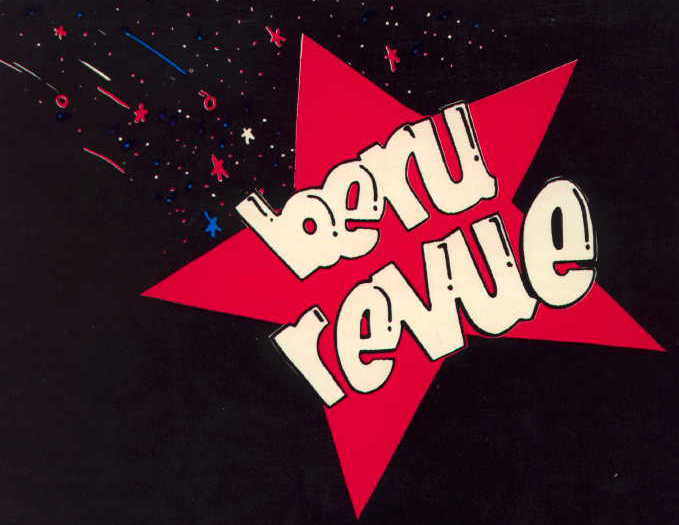

You don't know where to go
You don't know what to say
You're
missing the point
You're only getting in the way
You don't know where
to go
You don't know what to wear
You smoke another joint
You won't
be going anywhere
Where is the -- ?
Where's the real rock?
So gimme
some!
You gimme some real rock and -- What?
Real rock and -- Whoop!
Real rock!
I'm driving in my car
I listen to the radio
I'll have a
look at my girlfriend
And she looks like Marilyn Monroe
I'll smoke a
cigarette
I'll have a cup of herbal tea
I cannot forget
All the
good things you meant to me
Where is the -- ?
Where's the real rock?
So gimme some!
You gimme some real rock and -- What?
Real rock and --
Whoop!
Real rock!
All the castles made of sand make me hear surf music
again
All the synthesizers dancing in a chorus line -- What?
Watch the
fat ladies: They fox trot with their rhythm boxes
Just let me make my own
mistakes this time
You don't know where to go
You don't know what to
say
You're still missing the big point
You're still getting in the
way
I'm driving in my car
I listen to the radio
I'm still going out
with my girlfriend
And she still looks a lot like Marilyn -- Say what?
Where is the -- ?
Where's the real rock?
So gimme some!
You gimme
some real rock and -- What?
Real rock and -- Whoop!
Real
rock!
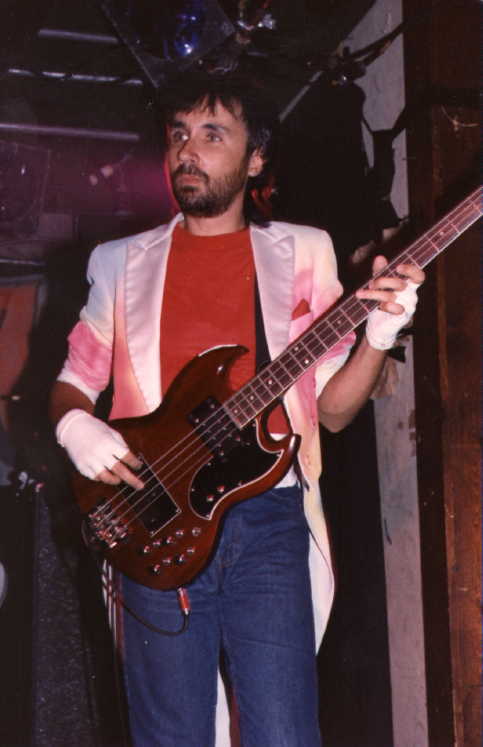 In the late 70s and early 80s Robert J. McCafferty, a dropout from the
University of Pennsylvania class of 1976, worked as a concierge at the
luxurious Bellevue Hotel (a fact which would later have great lyrical
significance) and hung out on the fringes of the South Street club scene,
managing Kenn Kweder (as if anyone could manage Kenn Kweder). One day he
woke up and wrote a song: "King of England." At the Haverford School, where he
had gone before Penn, his nickname had been "Bobberoo." He twisted this around
into his stage name, "Bob Beru," grabbed five of Philadelphia's best rock
musicians, and started Beru Revue. Their first gig was September 6, 1981, at
Grendel's Lair in Philadelphia.
In the late 70s and early 80s Robert J. McCafferty, a dropout from the
University of Pennsylvania class of 1976, worked as a concierge at the
luxurious Bellevue Hotel (a fact which would later have great lyrical
significance) and hung out on the fringes of the South Street club scene,
managing Kenn Kweder (as if anyone could manage Kenn Kweder). One day he
woke up and wrote a song: "King of England." At the Haverford School, where he
had gone before Penn, his nickname had been "Bobberoo." He twisted this around
into his stage name, "Bob Beru," grabbed five of Philadelphia's best rock
musicians, and started Beru Revue. Their first gig was September 6, 1981, at
Grendel's Lair in Philadelphia.Tommy Pinto soon replaced the original drummer, Bob Wynn. Berklee School of Music graduate Greg "T-Bone" Davis played virtuoso guitar. Former Secret Kids filled out the line-up: Buzz Barkley on keyboards, Johnny Sacks on bass, and Jerry Healy on guitar. Nick Norris managed the band.
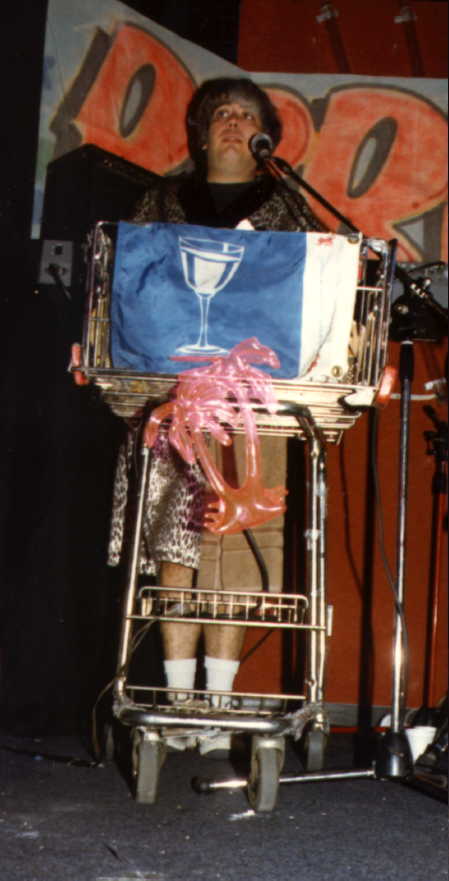 The first time I saw Beru Revue was on January 18, 1985, at Central Park in
Wayne, Pennsylvania. I arrived at the club just seconds before the band went on
stage. I had no previous knowledge of what they might be like, except for a few
of their songs I had heard on the radio, but which had made little impression
on me one way or the other. The fact that I did not know what to expect was
probably the best preparation I could have had for what was to follow. The
immediate effect they had on me as they appeared and did their first number was
overwhelming. I felt as if a longstanding void in my life had been filled.
Before the first song was even over, I knew that this was my band, the band
that addressed my particular recreational needs. I had not felt this strongly
on the side of a band in many years. As I listened to "Bwaah," their finale
that night, I felt an extraordinary sense of being fully at home with the
experience, just as I had felt when I first heard the Beatles' "She Loves You"
in 1964, the Rolling Stones' "Satisfaction" in 1965, the Byrds "5D" in 1966,
the Who's "I Can See For Miles" in 1967, Jefferson Airplane's "The Ballad of
You and Me and Pooneil" in 1968, Led Zeppelin's "Babe I'm Gonna Leave You" in
1969, the Grateful Dead's "Box of Rain" in 1970, Jethro Tull's "Wind Up" in
1971, David Bowie's The Rise and Fall of Ziggy Stardust and the Spiders from
Mars in 1972, Mott the Hoople's "Violence" in 1973, Eric Clapton's "Let it
Grow," in 1974, or the Kinks' "Education" in 1975. In fact, no music had
generated in me a positive feeling of such intensity at least since the
Police's "So Lonely" in 1978. This Beimichsein, as the Germans might
call it, was total and unqualified. I felt that living in Philadelphia in 1985
was culturally comparable to living in Liverpool in 1963, Los Angeles in 1965,
or San Francisco in 1967, in the midst of such exciting yet embryonic rock
music environments.
The first time I saw Beru Revue was on January 18, 1985, at Central Park in
Wayne, Pennsylvania. I arrived at the club just seconds before the band went on
stage. I had no previous knowledge of what they might be like, except for a few
of their songs I had heard on the radio, but which had made little impression
on me one way or the other. The fact that I did not know what to expect was
probably the best preparation I could have had for what was to follow. The
immediate effect they had on me as they appeared and did their first number was
overwhelming. I felt as if a longstanding void in my life had been filled.
Before the first song was even over, I knew that this was my band, the band
that addressed my particular recreational needs. I had not felt this strongly
on the side of a band in many years. As I listened to "Bwaah," their finale
that night, I felt an extraordinary sense of being fully at home with the
experience, just as I had felt when I first heard the Beatles' "She Loves You"
in 1964, the Rolling Stones' "Satisfaction" in 1965, the Byrds "5D" in 1966,
the Who's "I Can See For Miles" in 1967, Jefferson Airplane's "The Ballad of
You and Me and Pooneil" in 1968, Led Zeppelin's "Babe I'm Gonna Leave You" in
1969, the Grateful Dead's "Box of Rain" in 1970, Jethro Tull's "Wind Up" in
1971, David Bowie's The Rise and Fall of Ziggy Stardust and the Spiders from
Mars in 1972, Mott the Hoople's "Violence" in 1973, Eric Clapton's "Let it
Grow," in 1974, or the Kinks' "Education" in 1975. In fact, no music had
generated in me a positive feeling of such intensity at least since the
Police's "So Lonely" in 1978. This Beimichsein, as the Germans might
call it, was total and unqualified. I felt that living in Philadelphia in 1985
was culturally comparable to living in Liverpool in 1963, Los Angeles in 1965,
or San Francisco in 1967, in the midst of such exciting yet embryonic rock
music environments.
Beru Revue's bassist, drummer, keyboardist, and two guitarists took stage just I came within sight of it. They were evidently among the best skilled rock musicians in Philadelphia at the time, which is quite an honor in that part of the world. I liked the riffs they were playing as intro, but when the sixth member, the singer, entered a few moments later I was instantly astounded. The first time I saw Bob Beru he was wearing faded pink high-top sneakers, bright pink sweatsocks, peach jodhpurs, a pink satin cummerbund, a light pink ruffled shirt, a somewhat darker pink bow tie, a deep pink roundabout jacket with braid and epaulets, light pink cloth gloves, ruby red sunglasses, full facial make-up: clown white with exaggerated red and yellow highlights and a big red rectangle under each eye and a battered old American army helmet over his shoulder-length straight blond hair. The strobe lights were flashing and he was dancing like a big, muscular acrobat, picking up all his cues with timing that Jack Benny would have envied, and twirling a nightstick dangerously close to the noses of front-row onlookers. He had the best self-confidence on stage of any performer I have ever seen, before or since. He may have been only a local celebrity, but he was certainly a past master of his craft. I remember wondering how much longer Philadelphia would be able to enjoy him before he became a national star. That he never achieved wider fame was certainly not the fault of his performance.
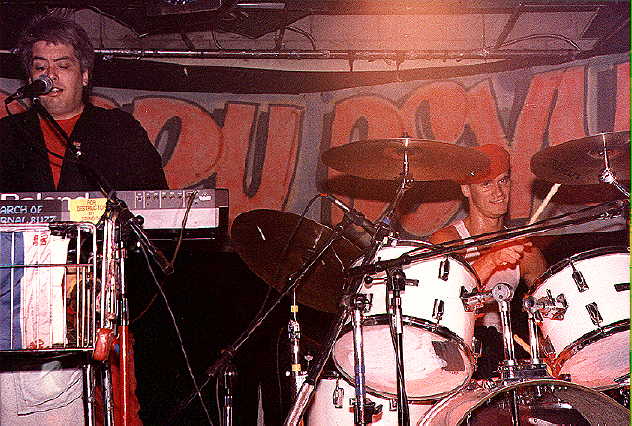 The drummer was dressed in a torn muscle tee shirt, and with his short,
slicked-back brown hair, he looked like the typical greasy South Philadelphia
street punk. The raven-haired bass player wore regulation army issue camouflage
pants and boots, but above the waist he was strictly formal, with black tie and
tails, red cummerbund, and black lace half-gloves. The keyboardist wore a
knee-length fur lined silk bathrobe, with fur slippers and bare legs. His
steel-gray hair seemed from the front to be cut conventionally, but the tail in
back reached his waist. His electric piano rested across the top of a real
shopping cart filled with toys, wigs, gizmos, spare parts, kindergarten rhythm
instruments, garish bric-a-brac, and God-knows-what-else. The two guitarists
were dressed alike, all in yellow, with black graffiti covering their shirts.
Bob would change his clothes with every song, his costume always somehow
appropriate to the message of the lyrics. The lighting was errorless.
The drummer was dressed in a torn muscle tee shirt, and with his short,
slicked-back brown hair, he looked like the typical greasy South Philadelphia
street punk. The raven-haired bass player wore regulation army issue camouflage
pants and boots, but above the waist he was strictly formal, with black tie and
tails, red cummerbund, and black lace half-gloves. The keyboardist wore a
knee-length fur lined silk bathrobe, with fur slippers and bare legs. His
steel-gray hair seemed from the front to be cut conventionally, but the tail in
back reached his waist. His electric piano rested across the top of a real
shopping cart filled with toys, wigs, gizmos, spare parts, kindergarten rhythm
instruments, garish bric-a-brac, and God-knows-what-else. The two guitarists
were dressed alike, all in yellow, with black graffiti covering their shirts.
Bob would change his clothes with every song, his costume always somehow
appropriate to the message of the lyrics. The lighting was errorless.
The song lyrics were intelligible and intelligent, with satirical content rivaling some of the best efforts of the Kinks. The instrumental musicianship, especially the frequent exchange of riffs between the two guitarists, was complex and masterly, without being pretentious. The songwriting, in which I later discovered all members of the band shared, was quite innovative, and very much in the post-British-invasion tradition of hard-driving, fully textured, progressive rock. They performed very few covers, but when they did, Bob usually rewrote the lyrics, for example, in Eddie Cochran's "Summertime Blues":
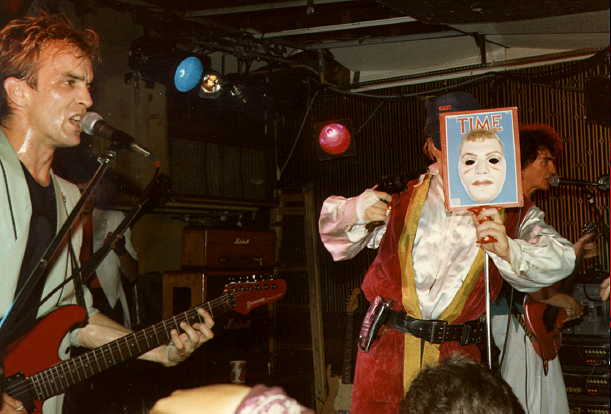 Beru Revue was the epitome of a comprehensive multimedia presentation, a smooth
blend of not only instrumental virtuosity and refreshing lyrics, but also
dance, costuming, props, theatre, comedy, plastic art, and above all, surprise.
No two shows were ever the same, and no one knew what Bob would do, say, or use
next. But on stage he always remained in control of himself and his
audience.
Beru Revue was the epitome of a comprehensive multimedia presentation, a smooth
blend of not only instrumental virtuosity and refreshing lyrics, but also
dance, costuming, props, theatre, comedy, plastic art, and above all, surprise.
No two shows were ever the same, and no one knew what Bob would do, say, or use
next. But on stage he always remained in control of himself and his
audience.
Ironically, the multimedial nature of their show, which had been the main reason for their original success, was also the reason for their failure. Steve Mountain, their manager after March 1985, seems never to have understood their uniqueness. He enforced the gradual separation of Beru Revue's music from its theatrics, and at last, in order to force them to concentrate more single-mindedly on the music itself in preparation for a recording career, forbade them the use of props and costumes on stage. But this decision was the death blow for the group.
Bob is not a singer of wide range; and without the added visual elements of the show to compensate for his lack of strictly vocal prowess, the shows often failed to ignite the old spark. The new managerial fiats seemed to sap the strength from the rest of the band as well. They no longer played with the same fervor. They seemed not to enjoy themselves on stage as much as they had previously. Internal dissension grew. Two members left. An attempt to replace one of them and another attempt to continue with only four both failed to recapture their former esprit de corps. So, after seven brave years, they stalemated and dissolved.
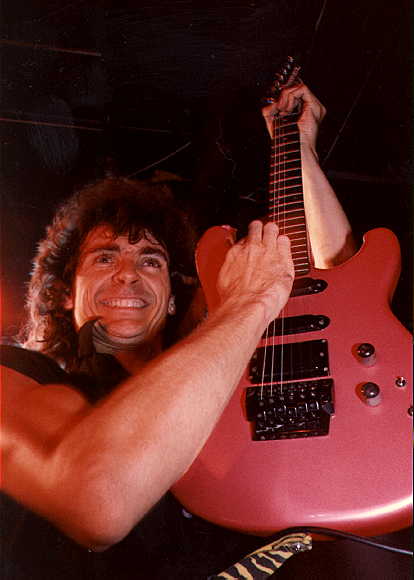 The point of all this is not that Beru Revue's music itself was enhanced by
their stage show. Indeed, it was not, and could not have been, enhanced by
these means. Rather, the actual performing of the music was facilitated by the
whole show, as if the individual songs could not have been abstracted from
their greater milieu without either cheapening or damaging them in some way. In
other words, the energy and excitement of being live on stage, coupled with the
planned vivacity of the show itself, enabled the band to play the same songs
better, i.e., with a higher level of authentic feeling than they could have
played them either in the recording studio or at rehearsal; and the audience
felt this difference immediately. The difference was of the same kind as that
in the film Butch Cassidy and the Sundance Kid between the results of
Sundance's marksmanship when he had to stand still and those of when he was
allowed to move his entire body as he shot. Beru Revue's songs were not
materially different in concert, but their presentation was more fully
energized, as thus also was proportionally the response of the audience.
The point of all this is not that Beru Revue's music itself was enhanced by
their stage show. Indeed, it was not, and could not have been, enhanced by
these means. Rather, the actual performing of the music was facilitated by the
whole show, as if the individual songs could not have been abstracted from
their greater milieu without either cheapening or damaging them in some way. In
other words, the energy and excitement of being live on stage, coupled with the
planned vivacity of the show itself, enabled the band to play the same songs
better, i.e., with a higher level of authentic feeling than they could have
played them either in the recording studio or at rehearsal; and the audience
felt this difference immediately. The difference was of the same kind as that
in the film Butch Cassidy and the Sundance Kid between the results of
Sundance's marksmanship when he had to stand still and those of when he was
allowed to move his entire body as he shot. Beru Revue's songs were not
materially different in concert, but their presentation was more fully
energized, as thus also was proportionally the response of the audience.
A key indication that this interpretation is accurate is that Beru Revue's original effect on most of us eventual Beruvians when we were familiar with only their sound was either negative or neutral; but as soon as we had become exposed to their entire show, their effect on us was momentous. In my own case, before I saw them in concert, their music had meant little to me, but afterwards, whenever I heard a Beru Revue song outside a concert setting, it would recall to mind memories of their live performances. It was, after all, their whole stage show – costumes, theatrics, dancing, rapport with the audience, satirical content, etc., as well as music – which constituted their appeal; and their music served only as the cement which held the show together, or made it coherent and memorable for the audience. Without the music, the show would not have been worth the time it took to watch it; but with it, the show took on the aspect of an integrated, perhaps even consummate, unit of entertainment. That is to say, music was the ultimate source of Beru Revue's power.
Somewhere in the sands of Okinawa All my heroes are dead Buried at Guadalcanal Raising up the flag on Iwo
Jima Beru Revue's song titles (probably incomplete, but as many as I can remember)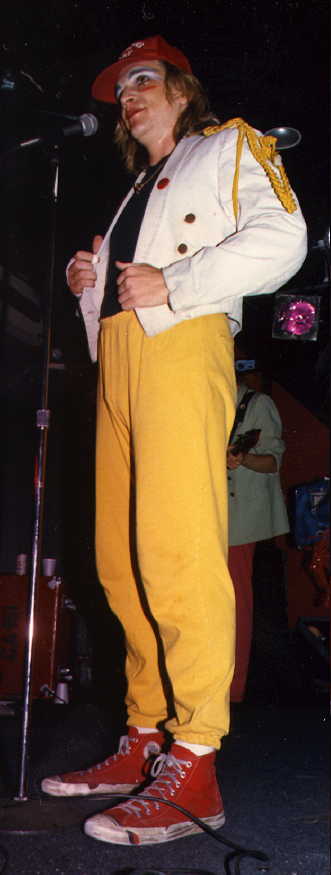
| I went downtown, got my
wife Guardian
Angels keepin' me safe No help for the hopeless
Make a little timebomb, tie it up tight It seems so odd To be an act of God The evidence is clear The devil's at work here Emotional excuse for requi-ay-em I wanna hang around with the fags 'cause they've got manners I'm a hungry dude, and I'm tired too Send out the papal S.W.A.T. teams Headlines in the New York Times Send out the TV news crews Got a five o'clock deadline Be on Time Johnny Sacks, he's a dick Private detective at laaaaaaarge Things aren't always as they seem, are they? When I went out looking for the truth TIDBIT: Johnny Sacks's favorite Beru Revue gig was opening for the Hooters at the United States Military Academy, West Point. But now he's doing time It was a shock to our morality But there was no crime We'll go home tonight And see the gambling advertisements on TV Reaching out across the country All aboard in Philadelph-eye-ay Ridin' high across the nation Gettin' off in Californ-eye-ay Trains are cool! We won't go until we get some We won't go until we get some We won't go until we get some So bring it out here! We're building castles in Kentucky We're building them in Spain Uh huh! Oh ho! We're moving to Hawaii real soon |

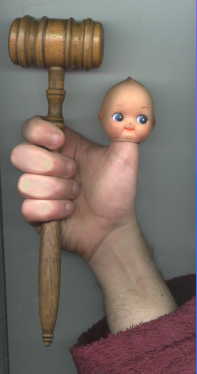
You can't get a drink 'cause nobody knows you
Wakin' up when the party's over Maybe you can be like one of us The few, the proud, the Judges Get me high, or get me out of here I wanna die, I want another beer I
work six days a week Get me high, or get me out of here I do not know my kids Get me high, or get me out
of here 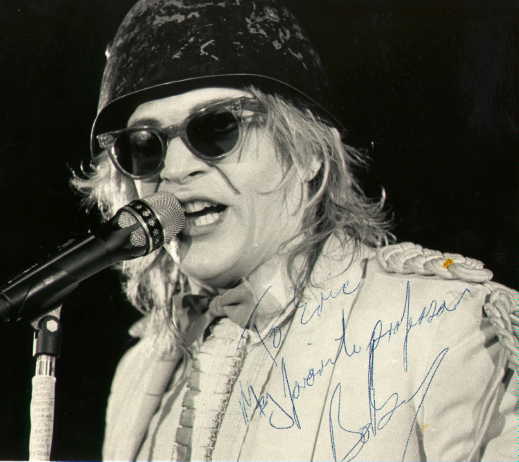 BE CAREFUL TONIGHT
BE CAREFUL TONIGHT Woke up to kick a junkie off of
my front porch It's paranoia Afro leaders are outside
and they're bangin' down the door It's paranoia Black
unemployment is up to 58% It's paranoia So you be careful. Tonight is our night, all night | I got a job, I got a job Even though it doesn't look like much of a job to you I got a job, I got a job And I know it ain't much, but it's all I'm able to do Isn't that what Engels meant, not so long ago? WOMEN CAN FLY
All the world is sleeping The queen has gotten dressed up She's flying flying flying flying All the world is
sleeping I am the King of England gentlemen I don't die in a nuclear war I am the King of England gentlemen Something my people could not ignore 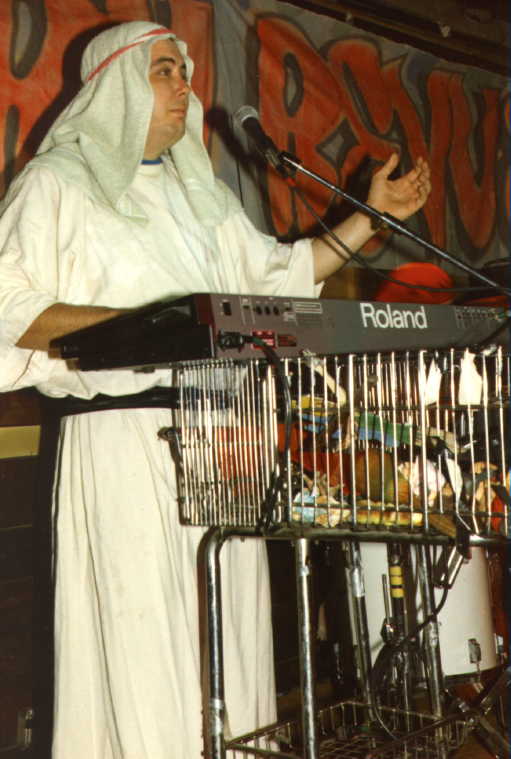 People laugh when I walk in a room
People laugh when I walk in a roomThat's all right with me I've got no patience for intolerance Or insincerity Or notoreity Or insuperiority I wanna play a little music Out there, I just wanna see Is anybody out there, waitin' for me? |
Does anyone remember the Reverend Rochelle the Rocker, Chaplain to the Stars?